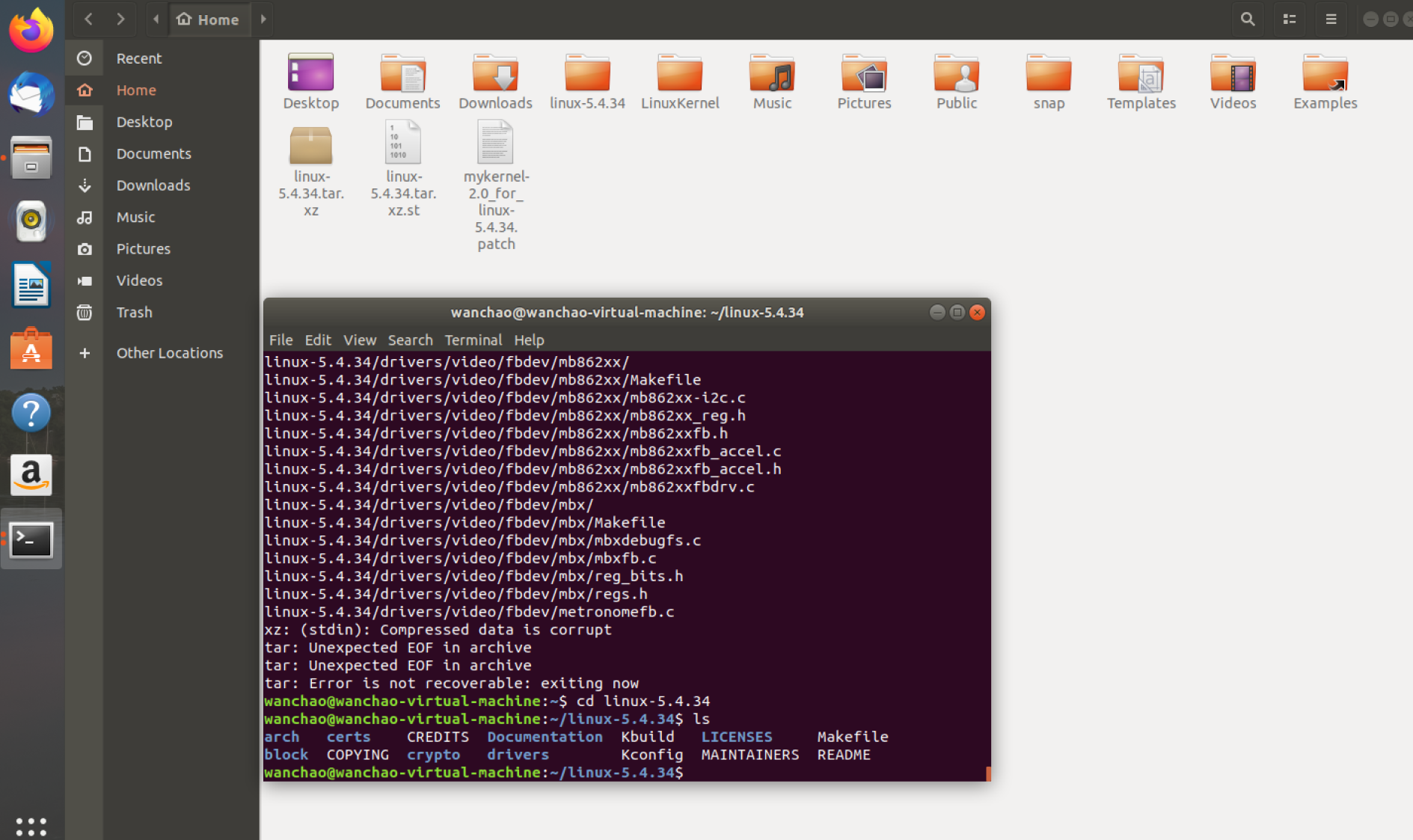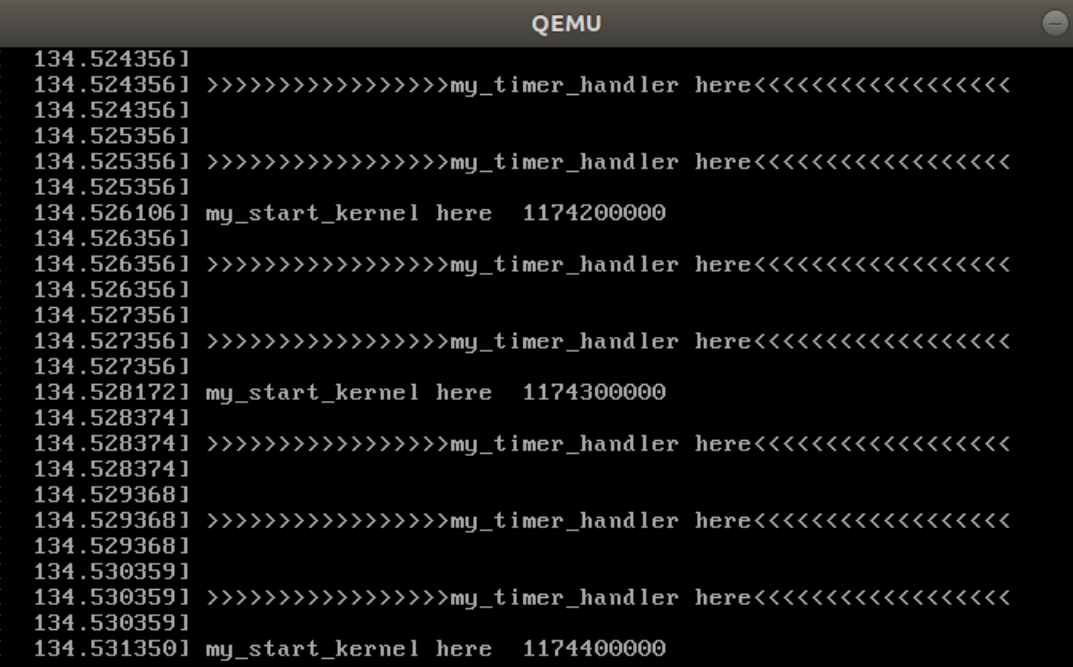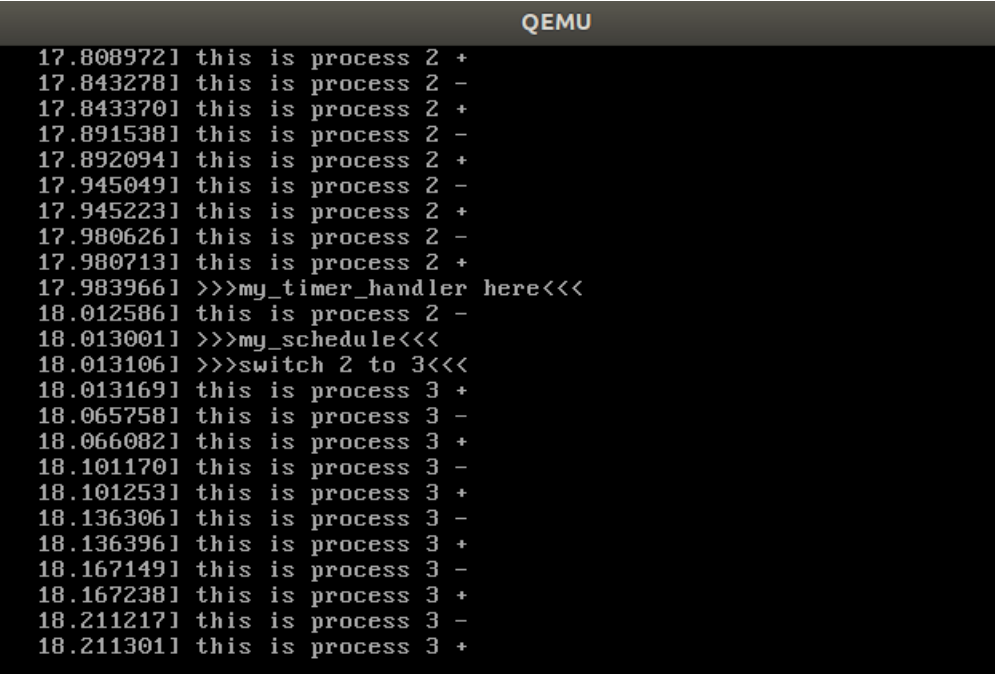1 配置实验环境
(1)本机实验环境:

(2)Set up mykernel 2.0 in Ubuntu 18.04
运行命令:
wget https://raw.github.com/mengning/mykernel/master/mykernel-2.0_for_linux-5.4.34.patch

出现拒绝连接的情况,需要修改hosts配置文件
执行命令:
sudo vi etc/hosts
但是群里有现成的文件,嫌麻烦直接拷贝。
然后执行命令:
sudo apt install axel axel -n 20 https://mirrors.edge.kernel.org/pub/linux/kernel/v5.x/linux-5.4.34.tar.xz
使用多线程下载内核文件。
解压:
xz -d linux-5.4.34.tar.xz tar -xvf linux-5.4.34.tar
解压成功后

继续执行:
cd linux-5.4.34 patch -p1 < ../mykernel-2.0_for_linux-5.4.34.patch sudo apt install build-essential libncurses-dev bison flex libssl-dev libelf-dev make defconfig # Default configuration is based on 'x86_64_defconfig' make -j$(nproc) # 编译的时间比较久哦
编译完成后出现如下界面:

继续:
sudo apt install qemu
qemu-system-x86_64 -kernel arch/x86/boot/bzImage
使用qemu启动内核

从qemu窗口中您可以看到my_start_kernel在执行,同时my_timer_handler时钟中断处理程序周期性执行
2 编写内核
(1)首先在mykernel目录下增加一个mypcb.h头文件,用来定义进程控制块,也就是进程结构体的定义。主要有进程号、进程状态、分配存储区、保存进程的现场、进程入口等。
#define MAX_TASK_NUM 4 #define KERNEL_STACK_SIZE 1024*2 /* CPU-specific state of this task */ struct Thread { unsigned long ip; unsigned long sp; }; typedef struct PCB{ int pid; volatile long state; /* -1 unrunnable, 0 runnable, >0 stopped */ unsigned long stack[KERNEL_STACK_SIZE]; /* CPU-specific state of this task */ struct Thread thread; unsigned long task_entry; struct PCB *next; }tPCB; void my_schedule(void);
(2)对mymain,c进行修改,创建进程,0号进程是手工创建的,启动0号进程需要一些汇编代码。再在mymain.c中添加my_process函数,用来作为进程的代码模拟一个进程,这里采用进程运行完一个时间片主动让出CPU的方式。
#include <linux/types.h> #include <linux/string.h> #include <linux/ctype.h> #include <linux/tty.h> #include <linux/vmalloc.h> #include "mypcb.h" tPCB task[MAX_TASK_NUM]; tPCB * my_current_task = NULL; volatile int my_need_sched = 0; void my_process(void); void __init my_start_kernel(void) { int pid = 0; int i; /* Initialize process 0*/ task[pid].pid = pid; task[pid].state = 0;/* -1 unrunnable, 0 runnable, >0 stopped */ task[pid].task_entry = task[pid].thread.ip = (unsigned long)my_process; task[pid].thread.sp = (unsigned long)&task[pid].stack[KERNEL_STACK_SIZE-1]; task[pid].next = &task[pid]; /*fork more process */ for(i=1;i<MAX_TASK_NUM;i++) { memcpy(&task[i],&task[0],sizeof(tPCB)); task[i].pid = i; task[i].thread.sp = (unsigned long)(&task[i].stack[KERNEL_STACK_SIZE-1]); task[i].next = task[i-1].next; task[i-1].next = &task[i]; } /* start process 0 by task[0] */ pid = 0; my_current_task = &task[pid]; asm volatile( "movq %1,%%rsp " /* set task[pid].thread.sp to rsp */ "pushq %1 " /* push rbp */ "pushq %0 " /* push task[pid].thread.ip */ "ret " /* pop task[pid].thread.ip to rip */ : : "c" (task[pid].thread.ip),"d" (task[pid].thread.sp) /* input c or d mean %ecx/%edx*/ ); } int i = 0; void my_process(void) { while(1) { i++; if(i%10000000 == 0) { printk(KERN_NOTICE "this is process %d - ",my_current_task->pid); if(my_need_sched == 1) { my_need_sched = 0; my_schedule(); } printk(KERN_NOTICE "this is process %d + ",my_current_task->pid); } } }
(3)在时钟中断处理过程中记录时间片,修改myinterrupt.c的my_timer_handler来记录时间片。在myinterrupt.c中添加进程切换的代码my_schedule(void),调度策略就是简单的排队等待调度,next = my_current_task->next就是进程调度,调度下一个进程。进程切换是那一段汇编代码。
#include <linux/types.h>
#include <linux/string.h>
#include <linux/ctype.h>
#include <linux/tty.h>
#include <linux/vmalloc.h>
#include <linux/string.h>
#include <linux/ctype.h>
#include <linux/tty.h>
#include <linux/vmalloc.h>
#include "mypcb.h"
extern tPCB task[MAX_TASK_NUM];
extern tPCB * my_current_task;
extern volatile int my_need_sched;
volatile int time_count = 0;
extern tPCB * my_current_task;
extern volatile int my_need_sched;
volatile int time_count = 0;
/*
* Called by timer interrupt.
* it runs in the name of current running process,
* so it use kernel stack of current running process
*/
void my_timer_handler(void)
{
if(time_count%1000 == 0 && my_need_sched != 1)
{
printk(KERN_NOTICE ">>>my_timer_handler here<<< ");
my_need_sched = 1;
}
time_count ++ ;
return;
}
* Called by timer interrupt.
* it runs in the name of current running process,
* so it use kernel stack of current running process
*/
void my_timer_handler(void)
{
if(time_count%1000 == 0 && my_need_sched != 1)
{
printk(KERN_NOTICE ">>>my_timer_handler here<<< ");
my_need_sched = 1;
}
time_count ++ ;
return;
}
void my_schedule(void)
{
tPCB * next;
tPCB * prev;
{
tPCB * next;
tPCB * prev;
if(my_current_task == NULL
|| my_current_task->next == NULL)
{
return;
}
printk(KERN_NOTICE ">>>my_schedule<<< ");
/* schedule */
next = my_current_task->next;
prev = my_current_task;
if(next->state == 0)/* -1 unrunnable, 0 runnable, >0 stopped */
{
my_current_task = next;
printk(KERN_NOTICE ">>>switch %d to %d<<< ",prev->pid,next->pid);
/* switch to next process */
asm volatile(
"pushq %%rbp " /* save rbp of prev */
"movq %%rsp,%0 " /* save rsp of prev */
"movq %2,%%rsp " /* restore rsp of next */
"movq $1f,%1 " /* save rip of prev */
"pushq %3 "
"ret " /* restore rip of next */
"1: " /* next process start here */
"popq %%rbp "
: "=m" (prev->thread.sp),"=m" (prev->thread.ip)
: "m" (next->thread.sp),"m" (next->thread.ip)
);
}
return;
}
|| my_current_task->next == NULL)
{
return;
}
printk(KERN_NOTICE ">>>my_schedule<<< ");
/* schedule */
next = my_current_task->next;
prev = my_current_task;
if(next->state == 0)/* -1 unrunnable, 0 runnable, >0 stopped */
{
my_current_task = next;
printk(KERN_NOTICE ">>>switch %d to %d<<< ",prev->pid,next->pid);
/* switch to next process */
asm volatile(
"pushq %%rbp " /* save rbp of prev */
"movq %%rsp,%0 " /* save rsp of prev */
"movq %2,%%rsp " /* restore rsp of next */
"movq $1f,%1 " /* save rip of prev */
"pushq %3 "
"ret " /* restore rip of next */
"1: " /* next process start here */
"popq %%rbp "
: "=m" (prev->thread.sp),"=m" (prev->thread.ip)
: "m" (next->thread.sp),"m" (next->thread.ip)
);
}
return;
}
(4)重新编译内核,运行结果如下
